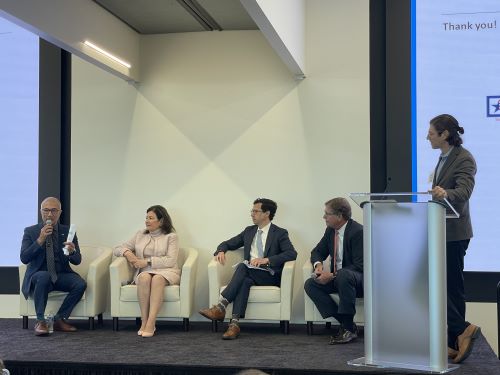Take Immigration Reform Past Talking Points
 Fom Hillary Clinton’s Nevada speech in favor of immigration reform to Jeb Bush’s unwavering support for it, every presidential candidate in both parties is busy staking out a position on immigration.
Fom Hillary Clinton’s Nevada speech in favor of immigration reform to Jeb Bush’s unwavering support for it, every presidential candidate in both parties is busy staking out a position on immigration.
The trouble is they’re using the same shopworn talking points they’ve always used. Rehashing the same arguments in front of a Congress that has repeatedly rejected them isn’t going to work. New reform ideas are needed.
Every immigration reform bill since 2002 has failed partly because they were essentially the same. They have all included the same three broad ideas: increase immigration enforcement, legalize some unauthorized immigrants, and liberalize legal immigration.
The first new idea is the merit-based green card category that was pushed by Sen. Marco Rubio in 2013 and promptly forgotten. That category would have issued up to 250,000 new green cards a year, half of them set aside for mid-skilled workers while the rest were for workers who possess skills like English or computer programming.
Allowing mid-skilled immigrants to even apply for green cards was so revolutionary and appealed to traditional American views of fairness in the immigration system that this reform was overlooked. It’s still a fresh idea that American voters, congressmen and senators haven’t seriously considered.
Another new idea is to reduce the role of the federal government by allowing states to create their own guest worker visa programs if they wish. American states have provided a democratic laboratory to test different policies like welfare reform, gun laws and tax policies — with some clear winners emerging. Why not apply that to immigration?
States could design migrant worker visas for any skill level for any occupation, entrepreneurs, investors, or those who want to buy real estate in blighted cities. Congress can then compare the outcomes among different states and choose the best policies based on experience. Or if the state system works even better than predicted, Congress could permanently hand guest workers over to the states.
America wouldn’t be stepping into the unknown here. Both Canada and Australia have their own provincial and state-based migration systems. According to a recent Cato Institute policy analysis, those systems are more responsive to local labor market demands than a one-size-fits-all federal program.
But state-based visas aren’t just a foreign idea. Since 2008, at least nine U.S. states have proposed to manage their own guest worker visa program — including every state that borders Mexico. This year both Texas and California are considering bills to ask the federal government for permission to experiment with different pilot programs of their own design. The federal government should allow states to run their own migration systems.
A third new idea is an immigration tariff, as proposed by the late Nobel Prize winning economist Gary Becker. Charging a fee for a permanent work-visa or a green card, say $20,000, could replace much of the government’s costly immigration bureaucracy with a revenue-generating machine. Migrants could be charged less if they are highly educated and younger, or more if they are less-skilled so as to compensate taxpayers for any potential fiscal costs.
Other than security and health screenings, governments have trouble picking immigrants who will succeed from those who won’t. The migrants who can pay or convince their families and employers to pick up the tab will likely have more to offer the U.S. economy than those who cannot. Even if those migrants end up failing in America, the tariff they paid will shield taxpayers from the potential costs.
Migrants, their families and their employers are already paying thousands of dollars in lawyer fees to jump through arcane bureaucratic hurdles — better to replace them and have the government charge a price. If the economy is booming, more migrants and employers would be willing to pay. If the economy is slow, then fewer will come.
Congress has fought over immigration reform almost every year since 2002. New ideas are out there. The question is whether Washington will take advantage of them.








